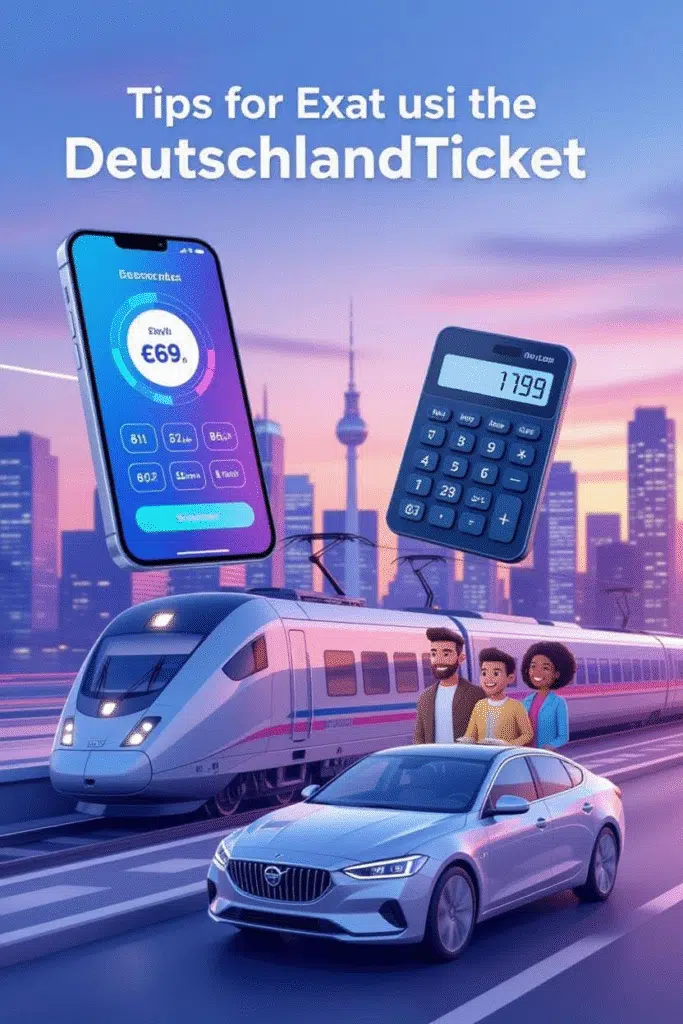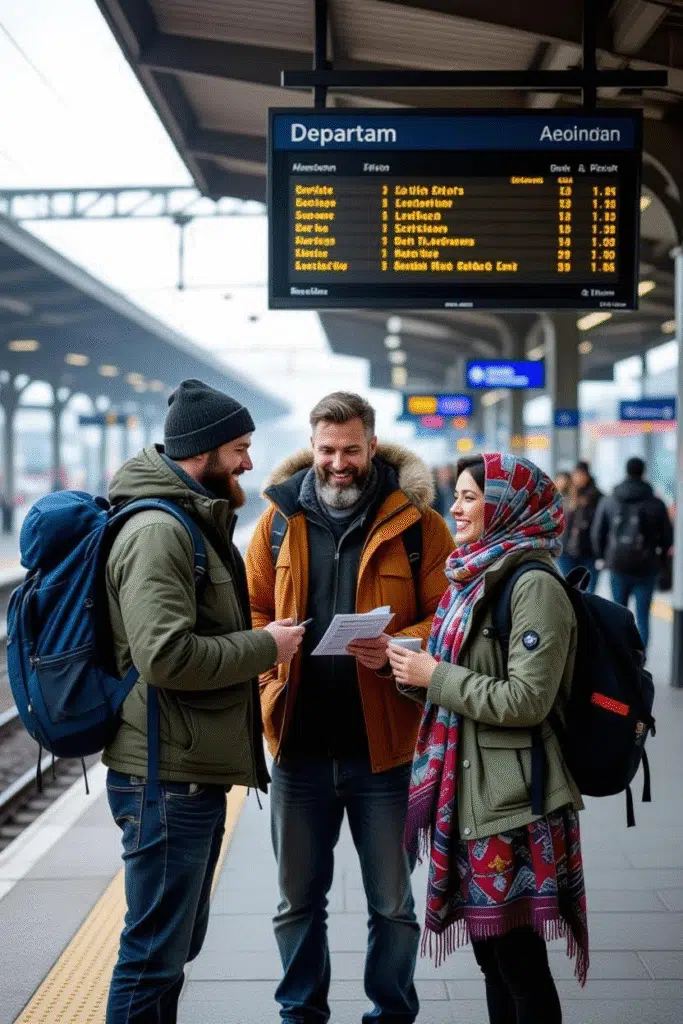
Introduction: Why the €69 Deutschlandticket Change Matters to You as an Expat
Imagine zipping across Germany on regional trains for weekend getaways or daily commutes, all for less than €2 a day. That was the reality of the €49 Deutschlandticket, launched in 2023 to make sustainable travel simple and affordable. But starting in 2025, the price has climbed to €69. For expats who rely on buses, trams, and S-Bahns to build daily routines in Berlin, Munich, Hamburg, or smaller cities, this shift is more than a price adjustment, it’s a rethink of your transport budget and lifestyle.
The Deutschlandticket began as a post-pandemic push to revive public transport and cut car use. It quickly became a hit with commuters, students, and newcomers alike. But rising energy costs, pressure to upgrade infrastructure, and reduced federal subsidies have pushed its price up. For many expats, especially those who relocate often or travel between cities, the pass still offers a level of freedom no single-city transport card can match.
This guide breaks it all down for you: what the €69 ticket covers, how it compares with local passes, and what it means for your everyday life. You’ll also find practical tips to save money and insights into how locals and policymakers are reacting.
With more than 13 million subscribers before the hike, and public transport use up 16% since its launch, the change affects millions. The question is simple: is the €69 ticket still worth it for you? Let’s find out.
The Evolution of the Deutschlandticket: From €49 to €69
When the Deutschlandticket launched in May 2023, it felt revolutionary. For just €49 a month, passengers could ride buses, trams, U-Bahns, S-Bahns, and regional trains across Germany without extra costs. It was designed as a post-pandemic lifeline, encouraging sustainable travel, reducing emissions, and providing commuters and newcomers with a simple and affordable way to get around.
The response was huge. Ridership surged, with 5.6 billion trips taken in the first half of 2024, a 6% increase compared to pre-ticket levels. Expats especially valued the flexibility: one subscription worked nationwide, perfect for weekend trips or relocations.
But by 2025, cracks appeared. Energy prices rose, staffing costs increased, and subsidies from Berlin and the federal states dwindled. Transport ministers warned that the €49 price tag was no longer sustainable. As one official put it, the challenge was “balancing affordability with viability.” The compromise: a €69 monthly ticket, effective January 2025.
Timeline of Key Changes
- 2023: €49 Deutschlandticket introduced nationwide.
- 2024: Ridership climbs 6%, hitting billions of trips.
- 2025: Price rises to €69 to cover costs and secure long-term funding.
13.4 Million Subscribers: How the Price Hike Tested Loyalty in Early 2025
The increase caused concern, but most passengers stayed on board. Subscriptions dipped slightly in early 2025, then stabilized at around 13.4 million. Today, nearly 60% of regional public transport users hold a Deutschlandticket.
For expats, the numbers matter. Germany is home to nearly 13 million foreign residents, and about 11% of their daily journeys rely on public transport. Whether for commutes, language courses, or city-hopping, the Deutschlandticket remains a budget staple, even with the higher price.
What the €69 Deutschlandticket Covers, and What It Doesn’t
The new €69 Deutschlandticket continues to deliver huge value, especially for those who rely on everyday public transport. It’s a monthly, nationwide pass that works across all 16 German states. Once subscribed, you can ride as much as you want, no zones, no hidden surcharges.
What’s included?
- Local buses, trams, and trolleybuses
- U-Bahn (subway) and S-Bahn (commuter rail)
- Regional trains (RE, RB, IRE)
- Select ferries and cable cars in some regions
- Valid 24/7, including weekends and holidays
This flexibility makes it ideal for expats. You can commute across city borders, take spontaneous day trips, or explore smaller towns without buying extra tickets.
But there are limits you need to know. The pass does not cover Germany’s long-distance network. That means no ICE, IC, or EC trains unless you pay separately. Airport express shuttles often fall outside the deal, too. And while you can bring pets or bikes, many networks require a small extra ticket for them. Finally, the Deutschlandticket is digital-only. You’ll need an app like DB Navigator or your local transport association’s app, and it renews monthly unless you cancel.
Covering 5.6 Billion Trips: The Scope of Regional Networks in 2025
The Deutschlandticket connects to regional services, handling about 5.6 billion journeys annually, up 6% compared to before its launch. Still, it leaves out the long-distance trains used by nearly 20% of inter-city travelers.
Here’s a quick breakdown:
| Included | Excluded | Expats’ Tip |
|---|---|---|
| Buses, trams, U-/S-Bahn | ICE, IC, EC trains | For fast Berlin–Munich trips, book ICE separately. |
| Regional trains (RE/RB) | Airport express lines (most) | Use RB/RE lines to airports when possible. |
| Some ferries, cable cars | Reserved-seat services | Check local apps for special add-ons. |
| Daily unlimited rides | Bikes/pets in some regions | Buy extra ticket for bike or large dog. |
Example: If you’re a Berlin expat working in Potsdam, your commute is fully covered. But if you’re visiting friends in Frankfurt from Hamburg, you’ll need a long-distance supplement or extra ticket.
Bottom line: For daily life and short-to-medium trips, the €69 Deutschlandticket is still a game-changer.
How the €69 Ticket Stacks Up Against Local and Regional Passes
One of the biggest questions for expats is simple: should you stick with a local monthly pass or upgrade to the €69 nationwide deal? The answer depends on your travel patterns.
In cities like Berlin, a monthly AB zone pass costs around €49, while an ABC pass can reach €86. In Munich, prices often range from €60 to €100 depending on zones. In Frankfurt’s Rhein-Main region, local passes typically start at €90 and climb higher for regional coverage. By contrast, the Deutschlandticket gives you unlimited travel across the country for €69 flat.
Savings of Up to 40%: When €69 Beats Local Passes for Frequent Travelers
For commuters or frequent movers, the math is clear. If you take 10 or more trips a month across regions—or need flexibility to travel between states, the €69 ticket usually wins. Compared to €80–€120 city-specific passes, you’re saving €20–€50 per month while unlocking nationwide coverage.
But for single-city residents with short commutes, the Deutschlandticket may be overkill. Local passes sometimes include family discounts, weekend group offers, or bundled extras the nationwide ticket doesn’t provide.
Here’s a snapshot:
| Ticket Type | Price | Coverage | Best For |
|---|---|---|---|
| Berlin AB Pass | €49 | Berlin inner city only | City-based expats |
| Munich Zone M | €60–€100 | Munich + surrounding zones | Fixed commuters |
| Rhein-Main Regional Pass | €90+ | Frankfurt metro + suburbs | Regional workers |
| Deutschlandticket | €69 | All local + regional networks nationwide | Expats moving/traveling across states |
Tip: Calculate your trips. If you’re an expat in Frankfurt who rides regional trains weekly to Mainz or Wiesbaden, the €69 pass pays for itself. If you rarely leave city limits, a cheaper local card may suffice.
Real Impacts: How the Change Affects Commuters, Students, and Families
The jump from €49 to €69 may sound steep, but the real effects vary depending on how you use the ticket. For many expats, the benefits still outweigh the extra cost, especially when factoring in mobility, savings, and sustainability.
Commuters

Daily riders are the most affected. Paying €20 more each month adds up to about €240 extra per year. Still, the convenience is hard to beat. Since the ticket’s launch, 560 million fewer car trips have been recorded, showing how commuters are swapping traffic jams for trains. For expats in tech hubs like Berlin or Munich, the ability to travel reliably between suburbs, office districts, and nearby cities remains a strong draw.
Students

Germany’s 2.9 million students, including many internationals, feel the pinch of the hike most sharply. Tight budgets don’t stretch easily, but the Deutschlandticket still pairs well with discounted semester passes. Many universities now integrate it into student fees, giving young expats an affordable way to move between campus, internships, and city life. Surveys show that youth adoption rates remain high, with usage rising for evening and weekend trips beyond class hours.
Families

For families, roughly 40% of expats in Germany, the unlimited nature of the pass is a game-changer. Weekend outings, after-school activities, or summer trips across states become easier to plan. The downside? There are no bundled child add-ons, so each person needs their own ticket. For a household of four, the math climbs quickly. Still, compared to fuel, parking, and highway tolls, the long-term savings are significant.
16% Ridership Surge: Boosting Access for 11% of Germany’s Daily Journeys
Overall, public transport now makes up 11% of all daily trips, a 16% jump since the Deutschlandticket began. Commuters, students, and families account for nearly 70% of this growth. Additionally, emissions have decreased by 5%, which is particularly important for eco-conscious expats seeking to minimize their environmental impact while living abroad.
Takeaway: Whether you’re rushing to work, getting to lectures, or planning a family outing, the €69 ticket still offers more freedom than most alternatives, if you use it often enough.
Stakeholder Reactions: What Cities and Transport Associations Are Saying
The €69 Deutschlandticket has sparked a mix of praise and concern among Germany’s transport players. Ridership remains strong, with over 13 million active subscriptions, but questions about long-term funding persist.
€4 Billion in Economic Savings: The Broader Ripple Effects
According to early studies, the first year of the Deutschlandticket generated €4 billion in wider economic savings. Fewer car trips meant less congestion, lower emissions, and reduced health costs linked to pollution. Cities like Berlin and Hamburg hailed the ticket as a success story, citing cleaner air and higher public transport use. Hamburg alone now counts 1.27 million holders, many of them expats.
But not all reactions are glowing:
- German Association of Cities: “The Deutschlandticket is at risk without more federal aid.” They warn that municipal budgets can’t absorb rising costs alone.
- VDV (Transport Association): Called the €69 price “sustainable for now” but stressed the need to monitor ridership trends carefully.
- Rural regions: Point out that 25% of Germans still lack reliable local networks, making the ticket less attractive outside major hubs.
For expats, this means the ticket’s future is politically charged. Urban areas where expats tend to settle, Berlin, Munich, and Hamburg, will keep pushing for strong support, while rural voices demand more subsidies to expand coverage.
The bottom line: the Deutschlandticket remains viable today, but its long-term survival will depend on continued federal and state cooperation.
Practical Tips for Expats: Navigating the New Reality

The €69 Deutschlandticket can still be a smart choice if you use it wisely. Here are some quick strategies to make the most of it as an expat:
- Audit your routes. If you take fewer than 10 trips a month, a local pass may save you €20 or more.
- Check employer perks. Many German companies subsidize up to 25% of the ticket cost; please ask your HR team.
- Buy via official apps. DB Navigator or your local transport association app ensures smooth renewals and digital proof.
- Track your usage. Apps like “Öffi” or “DB Navigator” let you compare actual journeys with ticket value.
- Plan for exclusions. Use car-sharing, FlixTrain, or long-distance bus services when ICE/IC trips aren’t covered.
- Think family math. Each person needs a ticket; for kids, check if local day passes are cheaper.
- Stay flexible. The Deutschlandticket is cancellable monthly, downgradable, or paused if your travel needs change.
Bottom line: with a little planning, you can adapt to the €69 price and still enjoy the freedom of nationwide travel. For most expats, it remains one of the best deals Germany offers.
Conclusion: Is the €69 Ticket Still a Win for Expats?

The €69 Deutschlandticket for expats marks a clear shift from the budget-friendly €49 launch, but it still delivers value. Yes, commuters face around €240 more per year, and students or families need to plan carefully. Yet the benefits remain strong: unlimited travel across 16 states, savings compared to many city passes, and a role in cutting emissions by reducing car trips.
With public transport usage up 6% year-on-year and more than 13 million subscribers holding on after the price hike, the Deutschlandticket continues to reshape mobility in Germany. For expats, the choice comes down to lifestyle. If you travel often, between cities, to work, or for weekend trips, it’s hard to beat.
Bottom line: the €69 ticket is still a smart bet for mobile expats. Plan ahead, track your usage, and you can keep exploring Germany affordably.
Have you tried the new ticket? Share your experiences in the comments below.

